Related Research Articles
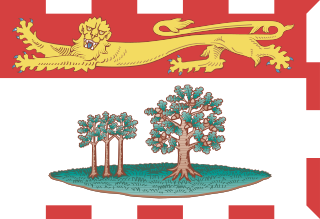
Prince Edward Island (PEI) is a province of Canada and one of the three Maritime provinces. It is the smallest province of Canada in both land area and population, but the most densely populated. Part of the traditional lands of the Miꞌkmaq, it was colonized by the French in 1604 and later ceded to the British following the conclusion of the Seven Years War in 1763. It was federated into Canada as a province in 1873. Its capital is Charlottetown.

The Privy Council of the United Kingdom is a formal body of advisers to the sovereign of the United Kingdom. Its membership mainly comprises senior politicians who are current or former members of either the House of Commons or the House of Lords.

Sir George-Étienne Cartier, 1st Baronet, was a Canadian statesman and Father of Confederation. The English spelling of the name—George, instead of Georges, the usual French spelling—is explained by him having been named in honour of King George III.
The Right Honourable is an honorific style traditionally applied to certain persons and collective bodies in the United Kingdom, the former British Empire and the Commonwealth of Nations. The term is predominantly used today as a style associated with the holding of certain senior public offices in the United Kingdom, Canada, Kenya, The Bahamas and New Zealand.
The Canadian order of precedence is a nominal and symbolic hierarchy of important positions within the governing institutions of Canada. It has no legal standing but is used to dictate ceremonial protocol.
The Cabinet of Canada is a body of ministers of the Crown that, along with the Canadian monarch, and within the tenets of the Westminster system, forms the government of Canada. Chaired by the prime minister, the Cabinet is a committee of the Queen's Privy Council for Canada and the senior echelon of the Ministry, the membership of the Cabinet and ministry often being co-terminal; as of November 2015 there are no members of the latter who are not also members of the former.

The Queen's Privy Council for Canada, sometimes called Her Majesty's Privy Council for Canada or simply the Privy Council (PC), is the full group of personal consultants to the monarch of Canada on state and constitutional affairs. Practically, the tenets of responsible government, requires the sovereign or her viceroy, the governor general of Canada, to almost always follow only that advice tendered by the Cabinet: a committee within the Privy Council composed usually of elected members of Parliament. Those summoned to the QPC are appointed for life by the governor general on the advice of the prime minister of Canada, meaning that the group is composed predominantly of former Cabinet ministers, with some others having been inducted as an honorary gesture. Those in the council are accorded the use of an honorific style and post-nominal letters, as well as various signifiers of precedence.

The Legislative Assembly of Prince Edward Island is the deliberative assembly of the government of the province of Prince Edward Island, Canada. The General Assembly meets at Province House, which is located at the intersection of Richmond and Great George Streets in Charlottetown. Bills passed by the Assembly are given royal assent by the Queen of Canada in Right of Prince Edward Island, represented by the Lieutenant-Governor of Prince Edward Island.
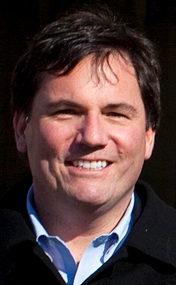
In the Canadian cabinet, the president of the Queen's Privy Council for Canada is nominally in charge of the Privy Council Office. The president of the Privy Council also has the largely ceremonial duty of presiding over meetings of the privy council, a body which only convenes in full for affairs of state such as the accession of a new Sovereign or the marriage of the Prince of Wales or heir presumptive to the Throne. Accordingly, the last time the president of the Privy Council had to preside over a meeting of the Privy Council was in 1981 on the occasion of Charles, Prince of Wales' engagement to Lady Diana Spencer. It is the equivalent of the office of lord president of the council in the United Kingdom.

Robert Watson Joseph Ghiz is a Canadian politician who served as the 31st premier of Prince Edward Island from 2007 to 2015. He is the son of the 27th premier, Joe Ghiz. On November 13, 2014 Ghiz announced he would be resigning as Premier in early 2015 as soon as the Liberal Party elected a new leader.

The Twenty-Eighth Canadian Ministry was the Cabinet, chaired by Prime Minister Stephen Harper, that governed Canada from the beginning of the 39th Parliament to the end of the 41st Parliament. Its original members were sworn into the Queen's Privy Council for Canada on February 6, 2006, exactly two weeks after the 2006 federal election and nine weeks and six days after the end of the 38th Canadian Parliament. Smaller than its recent predecessors, the Conservative Cabinet originally consisted of 27 members, including the Prime Minister. On January 4, 2007, five Secretaries of State were added to the ministry who are not members of the Cabinet itself. The cabinet resigned on the morning of November 4, 2015.
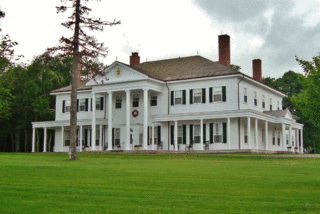
Government House of Prince Edward Island, often referred to as Fanningbank, is the official residence of the Lieutenant Governor of Prince Edward Island, as well as that in Charlottetown of the Canadian monarch. It stands in the provincial capital at 1 Terry Fox Drive; while the equivalent building in many provinces has a prominent, central place in the capital, the site of Prince Edward Island's Government House is relatively unobtrusive within Charlottetown, giving it more the character of a private home.
James Matthew Lee, was the 26th premier of Prince Edward Island (1981–86). He was the leader of the PEI Progressive Conservative Party from 1981 to 1987.

By the arrangements of the Canadian federation, the Canadian monarchy operates in Prince Edward Island as the core of the province's Westminster-style parliamentary democracy. As such, the Crown within Prince Edward Island's jurisdiction is referred to as the Crown in Right of Prince Edward Island, Her Majesty in Right of Prince Edward Island, or the Queen in Right of Prince Edward Island. The Constitution Act, 1867, however, leaves many royal duties in Prince Edward Island specifically assigned to the sovereign's viceroy, the Lieutenant Governor of Prince Edward Island, whose direct participation in governance is limited by the conventional stipulations of constitutional monarchy.

Charlottetown is the capital and largest city of the Canadian province of Prince Edward Island, and the county seat of Queens County. Named after Charlotte of Mecklenburg-Strelitz, queen consort of King George III of the United Kingdom, Charlottetown was an unincorporated town until it was incorporated as a city in 1855.
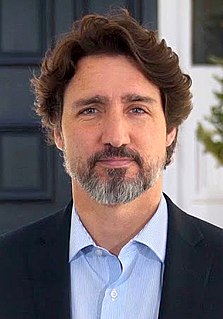
The twenty-ninth Canadian Ministry is the Cabinet, chaired by Prime Minister Justin Trudeau, that began governing Canada shortly before the opening of the 42nd Parliament. The original members were sworn in during a ceremony held at Rideau Hall on November 4, 2015. Those who were not already members of the Queen's Privy Council for Canada were sworn into the Privy Council in the same ceremony. The Cabinet currently consists of 35 members including Trudeau, with 17 women and 18 men. When the ministry was first sworn in, with fifteen men and fifteen women, it became the first gender-balanced cabinet in Canadian history.
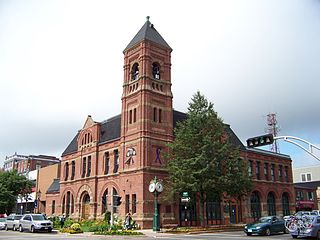
The Charlottetown City Council is the governing body for the city of Charlottetown, the county seat of Queen's County, Prince Edward Island, Canada. The most recent civic election took place in November 5, 2018. City council meets at Charlottetown City Hall.

Lists of historical members of the Privy Council for Canada cover former members of the Queen's Privy Council for Canada, which provides advice to the monarch of Canada on state and constitutional affairs. The lists are organized by period.

The Minister of Intergovernmental Affairs is the Minister of the Crown in the Canadian Cabinet who is responsible for the federal government's relations with the governments of the provinces and territories of Canada. The Minister of Intergovernmental Affairs does not head a full-fledged department, but rather directs the Intergovernmental Affairs Secretariat within the Privy Council Office. The current Minister of Intergovernmental Affairs is Dominic LeBlanc, who is concurrently serving as President of the Queen's Privy Council for Canada.
Michael Wernick is a retired Canadian public servant (1981-2019) who served as the 23rd Clerk of the Privy Council of Canada from 2016 to 2019. Wernick was previously the deputy minister for the Department of Indian Affairs and Northern Development from May 2006 to July 11, 2014. Before being the clerk for the Privy Council office, Wernick was the deputy clerk under predecessor Janice Charette. He has held several other positions in the Privy Council office and as Associate Deputy Minister for the Department of Canadian Heritage.
References
- ↑ "Historical Alphabetical List since 1867 of Members of the Queen's Privy Council for Canada". Archived from the original on 2012-01-14. Retrieved 2020-05-01.